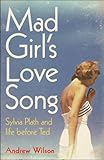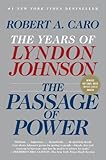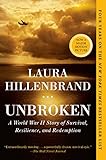Biographer Richard Holmes once wrote that his work was “a kind of pursuit… writing about the pursuit of that fleeting figure, in such a way as to bring them alive in the present.”
At the risk of sounding cliché, the best biographies do exactly this: bring their subjects to life. A great biography isn’t just a laundry list of events that happened to someone. Rather, it should weave a narrative and tell a story in almost the same way a novel does. In this way, biography differs from the rest of nonfiction.
All the biographies on this list are just as captivating as excellent novels, if not more so. With that, please enjoy the 30 best biographies of all time — some historical, some recent, but all remarkable, life-giving tributes to their subjects.
If you're feeling overwhelmed by the number of great biographies out there, you can also take our 30-second quiz below to narrow it down quickly and get a personalized biography recommendation 😉
📚
Which biography should you read next?
Discover the perfect biography for you. Takes 30 seconds!

1. A Beautiful Mind by Sylvia Nasar
This biography of esteemed mathematician John Nash was both a finalist for the 1998 Pulitzer Prize and the basis for the award-winning film of the same name. Nasar thoroughly explores Nash’s prestigious career, from his beginnings at MIT to his work at the RAND Corporation — as well the internal battle he waged against schizophrenia, a disorder that nearly derailed his life.

2. Alan Turing: The Enigma: The Book That Inspired the Film The Imitation Game - Updated Edition by Andrew Hodges
Hodges’ 1983 biography of Alan Turing sheds light on the inner workings of this brilliant mathematician, cryptologist, and computer pioneer. Indeed, despite the title (a nod to his work during WWII), a great deal of the “enigmatic” Turing is laid out in this book. It covers his heroic code-breaking efforts during the war, his computer designs and contributions to mathematical biology in the years following, and of course, the vicious persecution that befell him in the 1950s — when homosexual acts were still a crime punishable by English law.

3. Alexander Hamilton by Ron Chernow
Ron Chernow’s Alexander Hamilton is not only the inspiration for a hit Broadway musical, but also a work of creative genius itself. This massive undertaking of over 800 pages details every knowable moment of the youngest Founding Father’s life: from his role in the Revolutionary War and early American government to his sordid (and ultimately career-destroying) affair with Maria Reynolds. He may never have been president, but he was a fascinating and unique figure in American history — plus it’s fun to get the truth behind the songs.
Prefer to read about fascinating First Ladies rather than almost-presidents? Check out this awesome list of books about First Ladies over on The Archive.

4. Barracoon: The Story of the Last "Black Cargo" by Zora Neale Hurston
A prolific essayist, short story writer, and novelist, Hurston turned her hand to biographical writing in 1927 with this incredible work, kept under lock and key until it was published 2018. It’s based on Hurston’s interviews with the last remaining survivor of the Middle Passage slave trade, a man named Cudjo Lewis. Rendered in searing detail and Lewis’ highly affecting African-American vernacular, this biography of the “last black cargo” will transport you back in time to an era that, chillingly, is not nearly as far away from us as it feels.

5. Churchill: A Life by Martin Gilbert
Though many a biography of him has been attempted, Gilbert’s is the final authority on Winston Churchill — considered by many to be Britain’s greatest prime minister ever. A dexterous balance of in-depth research and intimately drawn details makes this biography a perfect tribute to the mercurial man who led Britain through World War II.

6. E=mc²: A Biography of the World's Most Famous Equation by David Bodanis
This “biography of the world’s most famous equation” is a one-of-a-kind take on the genre: rather than being the story of Einstein, it really does follow the history of the equation itself. From the origins and development of its individual elements (energy, mass, and light) to their ramifications in the twentieth century, Bodanis turns what could be an extremely dry subject into engaging fare for readers of all stripes.

7. Enrique's Journey by Sonia Nazario
When Enrique was only five years old, his mother left Honduras for the United States, promising a quick return. Eleven years later, Enrique finally decided to take matters into his own hands in order to see her again: he would traverse Central and South America via railway, risking his life atop the “train of death” and at the hands of the immigration authorities, to reunite with his mother. This tale of Enrique’s perilous journey is not for the faint of heart, but it is an account of incredible devotion and sharp commentary on the pain of separation among immigrant families.

8. Frida: A Biography of Frida Kahlo by Hayden Herrera
Herrera’s 1983 biography of renowned painter Frida Kahlo, one of the most recognizable names in modern art, has since become the definitive account on her life. And while Kahlo no doubt endured a great deal of suffering (a horrific accident when she was eighteen, a husband who had constant affairs), the focal point of the book is not her pain. Instead, it’s her artistic brilliance and immense resolve to leave her mark on the world — a mark that will not soon be forgotten, in part thanks to Herrera’s dedicated work.

9. The Immortal Life of Henrietta Lacks by Rebecca Skloot
Perhaps the most impressive biographical feat of the twenty-first century, The Immortal Life of Henrietta Lacks is about a woman whose cells completely changed the trajectory of modern medicine. Rebecca Skloot skillfully commemorates the previously unknown life of a poor black woman whose cancer cells were taken, without her knowledge, for medical testing — and without whom we wouldn’t have many of the critical cures we depend upon today.

10. Into the Wild by Jon Krakauer
Christopher McCandless, aka Alexander Supertramp, hitchhiked to Alaska and disappeared into the Denali wilderness in April 1992. Five months later, McCandless was found emaciated and deceased in his shelter — but of what cause? Krakauer’s biography of McCandless retraces his steps back to the beginning of the trek, attempting to suss out what the young man was looking for on his journey, and whether he fully understood what dangers lay before him.

11. Let Us Now Praise Famous Men: Three Tenant Families by James Agee
"Let us now praise famous men, and our fathers that begat us.” From this line derives the central issue of Agee and Evans’ work: who truly deserves our praise and recognition? According to this 1941 biography, it’s the barely-surviving sharecropper families who were severely impacted by the American “Dust Bowl” — hundreds of people entrenched in poverty, whose humanity Evans and Agee desperately implore their audience to see in their book.

12. The Lost City of Z: A Tale of Deadly Obsession in the Amazon by David Grann
Another mysterious explorer takes center stage in this gripping 2009 biography. Grann tells the story of Percy Fawcett, the archaeologist who vanished in the Amazon along with his son in 1925, supposedly in search of an ancient lost city. Parallel to this narrative, Grann describes his own travels in the Amazon 80 years later: discovering firsthand what threats Fawcett may have encountered, and coming to realize what the “Lost City of Z” really was.

13. Mao: The Unknown Story by Jung Chang
Though many of us will be familiar with the name Mao Zedong, this prodigious biography sheds unprecedented light upon the power-hungry “Red Emperor.” Chang and Halliday begin with the shocking statistic that Mao was responsible for 70 million deaths during peacetime — more than any other twentieth-century world leader. From there, they unravel Mao’s complex ideologies, motivations, and missions, breaking down his long-propagated “hero” persona and thrusting forth a new, grislier image of one of China’s biggest revolutionaries.

14. Mad Girl's Love Song: Sylvia Plath and Life Before Ted by Andrew Wilson by Andrew Wilson
Titled after one of her most evocative poems, this shimmering bio of Sylvia Plath takes an unusual approach. Instead of focusing on her years of depression and tempestuous marriage to poet Ted Hughes, it chronicles her life before she ever came to Cambridge. Wilson closely examines her early family and relationships, feelings and experiences, with information taken from her meticulous diaries — setting a strong precedent for other Plath biographers to follow.

15. The Minds of Billy Milligan by Daniel Keyes
What if you had twenty-four different people living inside you, and you never knew which one was going to come out? Such was the life of Billy Milligan, the subject of this haunting biography by the author of Flowers for Algernon. Keyes recounts, in a refreshingly straightforward style, the events of Billy’s life and how his psyche came to be “split”... as well as how, with Keyes’ help, he attempted to put the fragments of himself back together.

16. Mountains Beyond Mountains: The Quest of Dr. Paul Farmer, a Man Who Would Cure the World by Tracy Kidder
This gorgeously constructed biography follows Paul Farmer, a doctor who’s worked for decades to eradicate infectious diseases around the globe, particularly in underprivileged areas. Though Farmer’s humanitarian accomplishments are extraordinary in and of themselves, the true charm of this book comes from Kidder’s personal relationship with him — and the sense of fulfillment the reader sustains from reading about someone genuinely heroic, written by someone else who truly understands and admires what they do.

17. Napoleon: A Life by Andrew Roberts
Here’s another bio that will reshape your views of a famed historical tyrant, though this time in a surprisingly favorable light. Decorated scholar Andrew Roberts delves into the life of Napoleon Bonaparte, from his near-flawless military instincts to his complex and confusing relationship with his wife. But Roberts’ attitude toward his subject is what really makes this work shine: rather than ridiculing him (as it would undoubtedly be easy to do), he approaches the “petty tyrant” with a healthy amount of deference.

18. The Passage of Power: The Years of Lyndon Johnson IV by Robert A. Caro
Lyndon Johnson might not seem as intriguing or scandalous as figures like Kennedy, Nixon, or W. Bush. But in this expertly woven biography, Robert Caro lays out the long, winding road of his political career, and it’s full of twists you wouldn’t expect. Johnson himself was a surprisingly cunning figure, gradually maneuvering his way closer and closer to power. Finally, in 1963, he got his greatest wish — but at what cost? Fans of Adam McKay’s Vice, this is the book for you.

19. Prairie Fires: The American Dreams of Laura Ingalls Wilder by Caroline Fraser
Anyone who grew up reading Little House on the Prairie will surely be fascinated by this tell-all biography of Laura Ingalls Wilder. Caroline Fraser draws upon never-before-published historical resources to create a lush study of the author’s life — not in the gently narrated manner of the Little House series, but in raw and startling truths about her upbringing, marriage, and volatile relationship with her daughter (and alleged ghostwriter) Rose Wilder Lane.

20. Prince: A Private View by Afshin Shahidi
Compiled just after the superstar’s untimely death in 2016, this intimate snapshot of Prince’s life is actually a largely visual work — Shahidi served as his private photographer from the early 2000s until his passing. And whatever they say about pictures being worth a thousand words, Shahidi’s are worth more still: Prince’s incredible vibrance, contagious excitement, and altogether singular personality come through in every shot.

21. Radioactive: Marie & Pierre Curie: A Tale of Love and Fallout by Lauren Redniss
Could there be a more fitting title for a book about the husband-wife team who discovered radioactivity? What you may not know is that these nuclear pioneers also had a fascinating personal history. Marie Sklodowska met Pierre Curie when she came to work in his lab in 1891, and just a few years later they were married. Their passion for each other bled into their passion for their work, and vice-versa — and in almost no time at all, they were on their way to their first of their Nobel Prizes.

22. Rosemary: The Hidden Kennedy Daughter by Kate Clifford Larson
She may not have been assassinated or killed in a mysterious plane crash, but Rosemary Kennedy’s fate is in many ways the worst of “the Kennedy Curse.” As if a botched lobotomy that left her almost completely incapacitated weren’t enough, her parents then hid her away from society, almost never to be seen again. Yet in this new biography, penned by devoted Kennedy scholar Kate Larson, the full truth of Rosemary’s post-lobotomy life is at last revealed.

23. Savage Beauty: The Life of Edna St. Vincent Millay by Nancy Milford
This appropriately lyrical biography of brilliant Jazz Age poet and renowned feminist, Edna St. Vincent Millay, is indeed a perfect balance of savage and beautiful. While Millay’s poetic work was delicate and subtle, the woman herself was feisty and unpredictable, harboring unusual and occasionally destructive habits that Milford fervently explores.

24. Shelley: The Pursuit by Richard Holmes
Holmes’ famous philosophy of “biography as pursuit” is thoroughly proven here in his first full-length biographical work. Shelley: The Pursuit details an almost feverish tracking of Percy Shelley as a dark and cutting figure in the Romantic period — reforming many previous historical conceptions about him through Holmes’ compelling and resolute writing.

25. Shirley Jackson: A Rather Haunted Life by Ruth Franklin
Another Gothic figure has been made newly known through this work, detailing the life of prolific horror and mystery writer Shirley Jackson. Author Ruth Franklin digs deep into the existence of the reclusive and mysterious Jackson, drawing penetrating comparisons between the true events of her life and the dark nature of her fiction.

26. The Stranger in the Woods: The Extraordinary Story of the Last True Hermit by Michael Finkel
Fans of Into the Wild and The Lost City of Z will find their next adventure fix in this 2017 book about Christopher Knight, a man who lived by himself in the Maine woods for almost thirty years. The tale of this so-called “last true hermit” will captivate readers who have always fantasized about escaping society, with vivid descriptions of Knight’s rural setup, his carefully calculated moves and how he managed to survive the deadly cold of the Maine winters.

27. Steve Jobs by Walter Isaacson
The man, the myth, the legend: Steve Jobs, co-founder and CEO of Apple, is properly immortalized in Isaacson’s masterful biography. It divulges the details of Jobs’ little-known childhood and tracks his fateful path from garage engineer to leader of one of the largest tech companies in the world — not to mention his formative role in other legendary companies like Pixar, and indeed within the Silicon Valley ecosystem as a whole.

28. Unbroken: A World War II Story of Survival, Resilience, and Redemption by Laura Hillenbrand
Olympic runner Louis Zamperini was just twenty-six when his US Army bomber crashed and burned in the Pacific, leaving him and two other men afloat on a raft for forty-seven days — only to be captured by the Japanese Navy and tortured as a POW for the next two and a half years. In this gripping biography, Laura Hillenbrand tracks Zamperini’s story from beginning to end… including how he embraced Christian evangelism as a means of recovery, and even came to forgive his tormentors in his later years.

29. Vera (Mrs. Vladimir Nabokov) by Stacy Schiff
Everyone knows of Vladimir Nabokov — but what about his wife, Vera, whom he called “the best-humored woman I have ever known”? According to Schiff, she was a genius in her own right, supporting Vladimir not only as his partner, but also as his all-around editor and translator. And she kept up that trademark humor throughout it all, inspiring her husband’s work and injecting some of her own creative flair into it along the way.

30. Will in the World: How Shakespeare Became Shakespeare by Stephen Greenblatt
William Shakespeare is a notoriously slippery historical figure — no one really knows when he was born, what he looked like, or how many plays he wrote. But that didn’t stop Stephen Greenblatt, who in 2004 turned out this magnificently detailed biography of the Bard: a series of imaginative reenactments of his writing process, and insights on how the social and political ideals of the time would have influenced him. Indeed, no one exists in a vacuum, not even Shakespeare — hence the conscious depiction of him in this book as a “will in the world,” rather than an isolated writer shut up in his own musty study.
***
If you're looking for more inspiring nonfiction, check out this list of 30 engaging self-help books, or this list of the last century's best memoirs!
